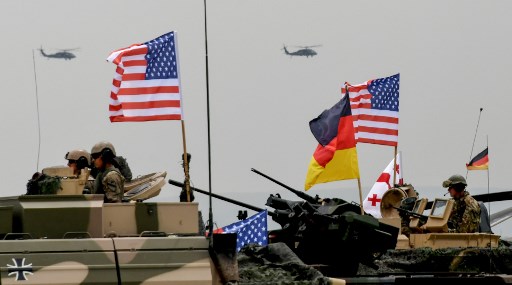
Georgia on August 1, 2018 launched large-scale joint military exercises with NATO forces – on the 10th anniversary of its war with Russia, which strongly opposes Tbilisi’s NATO membership bid. / AFP PHOTO / Vano SHLAMOV
WASHINGTON, United States (AFP) — The US Senate easily passed a $716.3 billion defense authorization bill Wednesday that ramps up military spending and bolsters America’s posture against Russia, while avoiding policy changes that would have antagonized President Donald Trump.
The National Defense Authorization Act (NDAA) passed 87 to 10 in the Senate a week after clearing the House of Representatives, and now heads to the White House for Trump’s signature.
The bill provides $69 billion in war funding known as overseas contingency operations, authorizes a 2.6 percent pay raise for members of the armed forces, and invests tens of billions in modernizing the Pentagon’s air and sea fleets and missile defenses.
It notably prohibits delivery of F-35 Joint Strike Fighter aircraft to Turkey, a NATO ally with increasingly fraught relations with Washington, until Ankara can confirm it will not buy Russia’s S-400 anti-aircraft missile system.
And while China and Russia are classified as “strategic competitors” to the United States, the legislation negotiated between the House and Senate left out a proposal by senators that would have blocked a deal Trump reached with Chinese telecommunications giant ZTE that eases tough financial penalties on the firm for helping Iran and North Korea evade American sanctions.
The capitulation smoothed things over with the White House, but it angered Republican Senator Marco Rubio, who voted against the bill.
“It’s time we opened our eyes,” Rubio told colleagues.
“We are engaged in a geopolitical competition, not with some poor agrarian country trying to catch up, but with a global super power who is quickly nipping at our heels and doing so unfairly, with the intent of replacing us in the world as the most powerful country militarily, economically, geopolitically and technologically.”
The NDAA also includes a provision allowing the administration to waive some Russia-related sanctions that would have barred Washington from selling defense-related equipment to countries using Russian technology.
Supporters of the provision stress that the change will help certain countries wean themselves off of Russian influence.
The bill including provisions which allow for better assessment of risks to US national security from transactions involving foreign firms aiming to gain access to sensitive American technology.
It also extends a restriction on US-Russian military cooperation, and authorizes $65 million to revamp the US nuclear arsenal by developing new “low-yield” nuclear weapons.
This year’s NDAA was named after Senator John McCain, the Senate Armed Services Committee chairman and national security hawk who is home in Arizona battling brain cancer.
“This year’s NDAA represents an important opportunity to implement an effective approach to confront a growing array of threats around the world,” McCain said.
Congress has passed the NDAA for 57 consecutive years, and Senate Democrat Richard Blumenthal noted its success marks “a victory for the notion that national security is above politics and party.”
© Agence France-Presse







